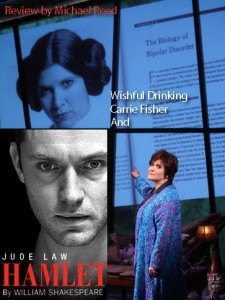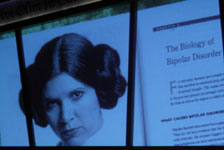 The tragedy of human foibles gone too far is the centerpiece of this work that has taken up brief residence on Broadway. Tens of thousands have flocked to the theater this fall to witness the well known personal catastrophe that this famous film performer portrays on stage eight times a week. It is a familiar story, one of betrayal within the family, one where the protagonist is lost, devastated and searching for a way out of the madness of her existence. This is a story worthy of Shakespeare’s quill.
The tragedy of human foibles gone too far is the centerpiece of this work that has taken up brief residence on Broadway. Tens of thousands have flocked to the theater this fall to witness the well known personal catastrophe that this famous film performer portrays on stage eight times a week. It is a familiar story, one of betrayal within the family, one where the protagonist is lost, devastated and searching for a way out of the madness of her existence. This is a story worthy of Shakespeare’s quill.
You might have guessed by now that the tragic stage character and performer being referenced here is, of course, Carrie Fisher and Carrie Fisher (Princess Leia) in “Wishful Drinking” at The Roundabout Theatre Company’s Studio 54 Theater through January 17. What were you expecting? “Hamlet” and British heartthrob Jude Law? In fact, both performers have graced the Broadway stage this fall in a continuation of last spring’s prevalent Broadway down-economy formula of film and television stars in limited run shows. (Mr. Law appears through December 6 at the Broadhurst Theatre.) The economy’s woes have been Broadway goers’ good fortune as Ms. Fisher and Mr. Law, in very different ways, have added considerable richness to an eclectic fall on the Great White Way. Their performances do have some valuable characteristics in common that we will get to later.
In a young New York theater season that has already included the familiar, original, in your face “Bye Bye Birdie,” “Race,” “Fela!” and something subtitled “The Vibrator Play,” the two productions, “Hamlet” and “Wishful Drinking,” add welcome gravitas, and unexpectedly in the case of Ms. Fisher, poignant, touching, and hilarious elements to the theater scene.
In the first few minutes of “Wishful Drinking” one realizes that the evening will not be a typically quaint and conventional theatrical biography of tightly produced self-serving scenes. Instead the audience is treated to Ms. Fischer’s recent experience of waking up next to a friend who was no longer, literally dead in the night . . . and away we go on a ride equal to any of Hans Solo’s in the Millennium Falcon. Ms. Fischer, indelibly Princess Leia for those of us who experienced the Star Wars phenomenon, created and stars in her story of infamous parents, skyrocketing fame, and the hell of addiction. The show’s style might be described as delightfully engaging gallows humor presented in a tell-all fusion of Oprah, Jerry Springer, and psychotherapy gone very wrong. The low brow, celebrity confessional opening did have this reviewer cringing in anticipation of a very long night; however, Ms. Fisher’s self-effacing infectious humor, unbelievable story, and the adept direction of Tony Taccone soon had me laughing out loud . . . between gasps of disbelief. The show’s casual tone is wonderfully enhanced by the fact that our heroine greets us barefoot in her jammies on a set that is a charming living room amalgamation of Star Wars memorabilia. From a family tree photo chart guide (“Hollywood Inbreeding 101”) that ends with Ms. Fisher’s daughter dating Elizabeth Taylor’s grandson (the same Elizabeth Taylor for whom her father left her mother) to tumultuous on again off again with Paul Simon, the Star Wars saga, and the dark purgatory of addiction and mental illness. Carrie Fisher commits the ultimate celebrity confessional. Instead of being turned off by what could easily have played as self-absorbed sympathy seeking, we are wowed by her as she makes us feel like a friend chatting on the couch. Is Ms. Fisher a celebrity in need of attention? Of course she is, but she has such a welcoming, side splitting way of letting us into her train wreck of a life that we forget the narcissism and celebrate the survivor that Carrie Fisher has become.
of waking up next to a friend who was no longer, literally dead in the night . . . and away we go on a ride equal to any of Hans Solo’s in the Millennium Falcon. Ms. Fischer, indelibly Princess Leia for those of us who experienced the Star Wars phenomenon, created and stars in her story of infamous parents, skyrocketing fame, and the hell of addiction. The show’s style might be described as delightfully engaging gallows humor presented in a tell-all fusion of Oprah, Jerry Springer, and psychotherapy gone very wrong. The low brow, celebrity confessional opening did have this reviewer cringing in anticipation of a very long night; however, Ms. Fisher’s self-effacing infectious humor, unbelievable story, and the adept direction of Tony Taccone soon had me laughing out loud . . . between gasps of disbelief. The show’s casual tone is wonderfully enhanced by the fact that our heroine greets us barefoot in her jammies on a set that is a charming living room amalgamation of Star Wars memorabilia. From a family tree photo chart guide (“Hollywood Inbreeding 101”) that ends with Ms. Fisher’s daughter dating Elizabeth Taylor’s grandson (the same Elizabeth Taylor for whom her father left her mother) to tumultuous on again off again with Paul Simon, the Star Wars saga, and the dark purgatory of addiction and mental illness. Carrie Fisher commits the ultimate celebrity confessional. Instead of being turned off by what could easily have played as self-absorbed sympathy seeking, we are wowed by her as she makes us feel like a friend chatting on the couch. Is Ms. Fisher a celebrity in need of attention? Of course she is, but she has such a welcoming, side splitting way of letting us into her train wreck of a life that we forget the narcissism and celebrate the survivor that Carrie Fisher has become.
Seen in the context of Ms. Fisher’s turbulent life and self-engineered exit from hell, “Hamlet” could easily be seen as a wimp of sorts. Luckily, the dark prince of Denmark’s latest appearance on Broadway comes in the form of Jude Law, who gives a physical and viscerally stirring performance in the role. While his performance has been met with some considerable criticism in the New York press, it is an interpretation that holds true for many who perhaps don’t remember every actor’s “Hamlet” since Olivier and are not capable of reciting every line of Shakespeare’s most known play. The rest of the cast from this Donmar Warehouse Production acquits itself quite well with standout performances by Ron Cook as Polonius and Gugu Mbatha-Raw, who manages the tricky tightrope of creating an Ophelia who is at once feminine and innocent, yet never weak or pitiful in her madness.
 Getting back to Mr. Law’s “Hamlet,” it will not be mistaken for the most nuanced or introspective interpretation ever done; but it does succeed where many others have failed, and in a way that the Bard himself just may have approved of. Mr. Law’s Hamlet is accessible—yes, the dreaded “A” word. It is no mystery that Shakespeare’s prose and iambic pentameter can be a problem for some audiences. Mr. Law’s take on “Hamlet” allows the Shakespeare uninitiated in, the moderately knowledgeable to enjoy, and hopefully many of the experts to appreciate. This after all follows Shakespeare himself in creating for a wide range of audience in order to pay the bills. Which brings us back to the connection with Ms. Fisher’s “Wishful Drinking” and a long running debate about Broadway. Does an accessible and popular production automatically preclude it from being of the highest theatrical caliber? Since we can’t ask the Bard, I recommend that you get to the Broadhurst and Studio 54 Theaters before “Hamlet” and “Wishful Drinking” close, and decide for yourself.
Getting back to Mr. Law’s “Hamlet,” it will not be mistaken for the most nuanced or introspective interpretation ever done; but it does succeed where many others have failed, and in a way that the Bard himself just may have approved of. Mr. Law’s Hamlet is accessible—yes, the dreaded “A” word. It is no mystery that Shakespeare’s prose and iambic pentameter can be a problem for some audiences. Mr. Law’s take on “Hamlet” allows the Shakespeare uninitiated in, the moderately knowledgeable to enjoy, and hopefully many of the experts to appreciate. This after all follows Shakespeare himself in creating for a wide range of audience in order to pay the bills. Which brings us back to the connection with Ms. Fisher’s “Wishful Drinking” and a long running debate about Broadway. Does an accessible and popular production automatically preclude it from being of the highest theatrical caliber? Since we can’t ask the Bard, I recommend that you get to the Broadhurst and Studio 54 Theaters before “Hamlet” and “Wishful Drinking” close, and decide for yourself.
Comments are closed.